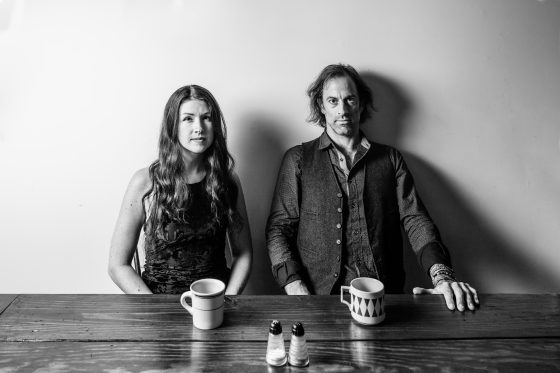
Photo: Rachael Renee Levasseur
The latest in our FFS 5 interview series is Atlanta-based folk band, Heart Hunters. At the heart of this heartful group is an inimitable husband and wife duo consisting of singer-songwriters Brianna Blackbird and Drew de Man. They recently sat down with For Folk’s Sake to discuss life in and out of music.
Please tell us a bit about yourself. Where are you from and how did you get started in music? Any defining moments along the path to present day?
We met while studying music therapy in Portland, Oregon, started a band together and fell in love on the road. Each of us comes from a different musical background. I was raised on a mix of classic rock and classical music. I studied classical piano, violin and voice as a kid. Around age 9 I got the full on calling and knew music was it. Drew was born singing, got a guitar from Mom at age 10 and dove in. A family friend – the eminent Memphis folklorist and musician Sid Selvidge – inspired and mentored him. In the mid-2000’s he fronted No River City, an Americana band that garnered critical praise and airplay, and did a lot of touring.
As an artist, how do you define success?
Success to me is being able to make my art and share it. It is organizing my life in such a way, that I am able to have art being my primary contribution to society, no day jobs, just art. Success is also internal, fully owning what it means to be an artist, the socio-policital implications as well as the role you can play in society. I think art has some responsibility to change things. Art can be a hammer, and until we have real justice and we no longer need a hammer, then art should be that very hammer. Rilke talks about the burden of being an artist, I do think it is partly the artists responsibility to improve society. Make it more humane. If we’re reaching people with these songs and turning them onto important ideas, that feels like success.
What do you find to be your greatest struggle when it comes to the music business?
Our great struggle when it comes to the music business, is a general desire to be playing music or doing really anything other than business. Neither one of us is very tech savvy and that also can be a challenge. But honestly we do what we gotta do, I mean we have all the social media sites one should have and an email list, etc. We do what we have to do for the business side of our music but we focus more on the music itself. We’re true folk musicians, in the sense that one year we might tour a ton, but the next year, we spend more time going to jams and potlucks, playing music with our community, rather than for an audience. The profession of the musician is older than commodified music (it serves different purposes too). We’re kind of anachronistic, so our business follows a pretty old-fashioned model. I guess that means we have often struggled to figure out how to deal with the music “business” in its capitalist form.
What do you think is the most realistic goal you can achieve as an artist/band? What do you hope to achieve?
We just hope to get our music out there to those that would appreciate it. I think that is our primary goal with pursuing career in music. We are definitely writing these songs for other people, and finding all those people is really important to us. We need to tell these stories and they’re the kind of stories that need to be heard. We also really want to go to Senegal or Mali or somewhere in West Africa and collaborate with musicians over there.
Outside of music, what do you like to do that you feel contributes to the creativity that you tap into for your music?
We have two kids, Lucien is 3 and Aurora is 9. They are absolutely an endless source of inspiration. We have been gardening a lot. We ponder on politics. Nature is always a respite and a refuge and we make sure we can always get away into the trees pretty easily, and a lot of our songs have a sort of ecological, naturalistic sense. We keep our sights on social justice. We also travel when we can! All of this stuff becomes fodder…
Photo: Rachael Renee Levasseur
